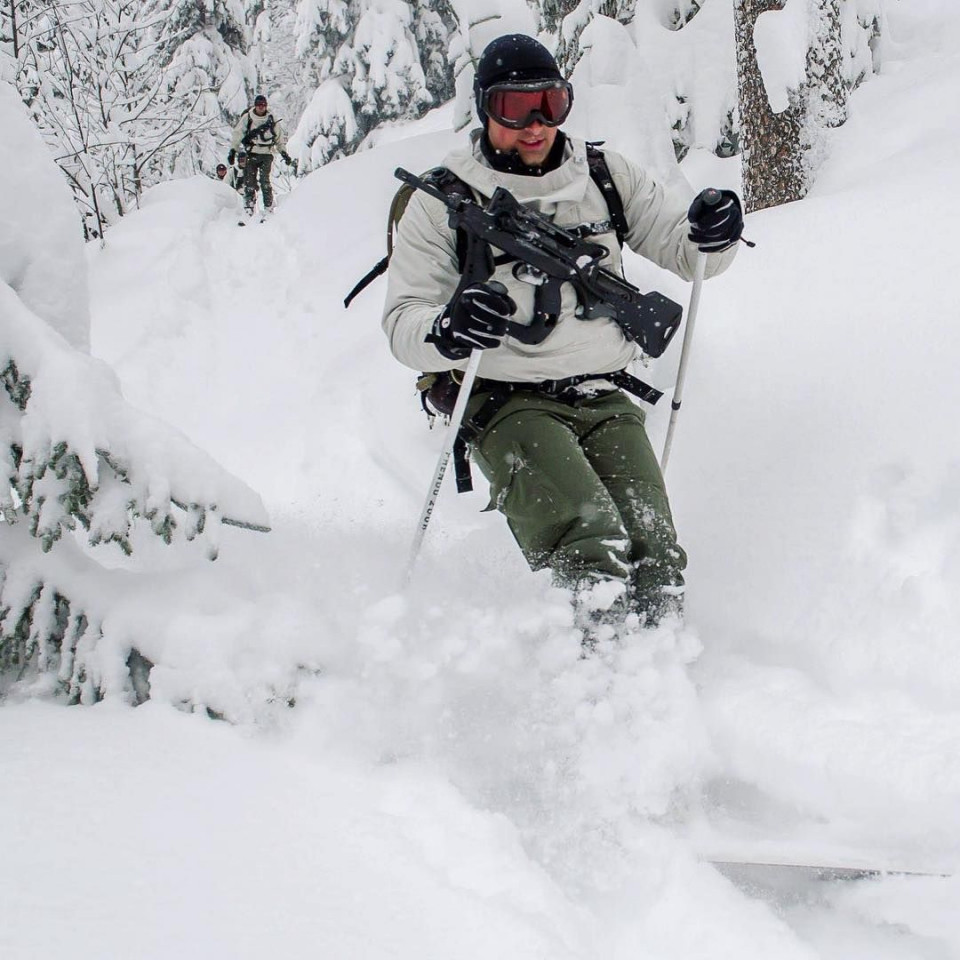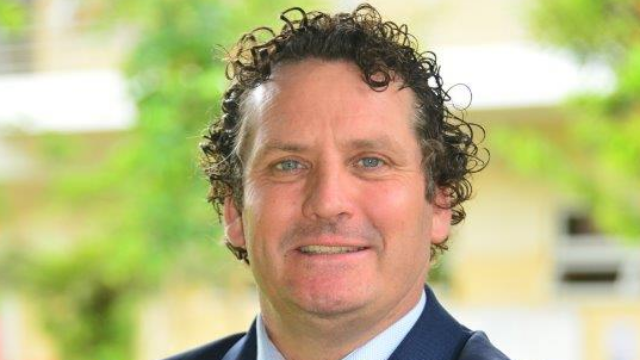Reflets Magazine #141 | Philippe Dariel (EXEC MBA 18): This Teacher Breaks Barriers
In Reflets Magazine #141, Philippe Dariel (EXEC MBA 18) tells us about how he shook up the French education system with his innovative initiatives in the schools he led, including a middle school in the forests of French Guiana, a vocational school threatened with closure, an Olympic training facility in Savoie, and French high schools in Puducherry and Mauritius. Here is a free online translation of the article.
Philippe Dariel was already demonstrating leadership qualities in his teenage years. “I made it onto the French national amateur youth football team, and I played most of my games as the team captain.” It was this aptitude for both leadership and sport that led him to pursue studies to become a physical education teacher. “I completed my degree at just 21, becoming the youngest teacher in my field in France.”
His first classroom would be… the 7th battalion Alpine Infantry – at his own request – as part of his military service. “I was the only Breton out of all the Alpine Infantry in Bourg Saint Maurice... 1000 km from the region I call home! During the week I was a ski instructor for my comrades in arms, and on weekends I was a mountain guide for the generals and their families.”
Military service complete, his next stop was the French capital, where he began his career in Paris’ finest high schools. “I remember the day when I received a note from a parent signed by French movie star Alain Chabat; his daughter was one of my students and had to be excused to attend filming for future hit movie Asterix and Obelix: Mission Cleopatra.”
New Horizons
Things took an unexpected turn when his partner also qualified as a teacher with the French national education system. “She didn’t have much of a choice for her first job: it was the Parisian suburbs, French overseas territories, or French Guiana.” The third option was the one they went for. “We landed in Sinnamary, 10 km from the launchpad used for Ariane rockets.”
It was a land of exploration, and perhaps better than other tropical destinations for those wanting to try new things. “We started suggesting lots of totally new projects at our school: pirogue lessons on the river that ran by the town, cross country running through the flood plains of the Pripri Yiyi with the caiman and capybara, chess tournaments with a life-size chess board and pieces…” He also started tennis and golf lessons for underprivileged and struggling schoolchildren. “It was a way to bring them out of their usual environment and stop them from thinking that it wasn’t for them”
His initiatives eventually caught the attention of Jean-Michel Blanquer, then the local chief education officer, and future Dean and President of ESSEC Group and French Minister for Education. Blanquer offered him the opportunity, at just 32 years old, to open a new high school in Grand-Santi, an isolated village in the middle of the Amazon rainforest, on the border with Suriname. “Most of the locals were the descendants of slaves on Surinamese plantations who, following their emancipation, found themselves cut off in this isolated region, where they were left to recreate their traditional djuka lifestyle. Many of them speak little French to this day.”
He would face other challenges, too. “I was expecting around 50 pupils for the first year of secondary school. But when the new school year started, more than 150 children from all secondary school age groups turned up. I had to form emergency classes in overcrowded classrooms…” But while education was in high demand, the region’s inaccessibility also made it difficult. “Most of the pupils lived a few kilometres from the village along the Maroni River, which was impassable thanks to dangerous rapids with vivid names like Gran Manfin (The End of Man), Man Bali (Everybody Screams). This meant that parents didn’t have the means to bring their children to school every day.” But never fear, Philippe Dariel was here: within a few weeks he had mobilised the local community to clear trails that bypassed the rapids and built a dozen or so pirogues, thereby establishing a “school bus” service. “Not only did we deliver access to education for all, but we also created businesses and jobs.”
Deepest Jungle to Highest Peaks
Philippe would soon return to France to serve as head of a vocational high school for mountain careers in Savoie that worked in partnership with an Olympic training facility. “I educated a whole generation of future champions all the way through to the baccalaureate: Tessa Worley, Alexis Pinturault, Niels Allègre…” The atmosphere could sometimes be... lively. “We regularly had to discipline Kevin Rolland, who used to ski down the residence’s stairs, and Mathieu Faivre skipped whole months of class to compete in his first competitions.”
On the Road Again
Then it was back overseas when he obtained a post as deputy head at the French school in Puducherry. This was yet another challenge, because as soon as he arrived, a tropical storm devastated this old royal college dating from 1826. “All of the school’s staff, and even the consul and ambassador, had to roll up their sleeves and pitch in to repair the damage”.
The school had been losing staff, but the disaster brought the team closer together, and they got to work to bring the school back to life better than ever before. “We launched an admission drive in a dozen or so Indian cities. The aim was to grow our reputation and recruit talented young people for a new science department focused on delivering excellence. The strategy paid off: of the ten students in the first year group, eight passed their baccalaureate with distinction, and two went on to study at the prestigious Louis Le Grand prep school in Paris.”
Enhanced Management
Five years later, Philippe Dariel learned that Jean-Michel Blanquer was now leading ESSEC Group. “It was his appointment that motivated me to return to France to earn my Executive MBA.” It may be an unusual decision for someone working in education, but it’s one that he wholeheartedly recommends. “Firstly, there are options available for people who can’t get their employer to pay for their course – I’d like to thank Thierry Graef at ESSEC Executive Education for helping me apply for grants. Secondly, the programme taught me to transition from an intuitive management style to a more methodical, rigorous approach that was also less stressful. In the past, I used to improvise and rely on my intuition; today, I plan ahead, because I’m familiar with the main principles in negotiation, support, and change management. Anyone in a management role would find it enlightening. It won’t necessarily transform your career, but it will radically change your attitude and how you relate to employees and projects.”
Philippe Dariel immediately demonstrated the value of what he had learned out in the real world: while he was studying towards his Executive MBA, he was also head of the D. Diderot vocational high school in Besançon – which he saved from closure by drawing on the principles he learned at ESSEC. “For every vocation we provided training for, there were unpopular courses that we struggled to fill and one hugely popular course with a waiting list. I grouped them all together into a single curriculum with options, which was a clearer model and more closely aligned with the more versatile courses that are becoming more commonplace today. The result was that we were able to enrol the talented applicants that had been put on the waiting list, which in turn meant that we had more students and a higher standard of learner. In parallel, I forged partnerships with major groups like Alstom and GE, so that our workshops could use quality materials. And lastly, I renamed the establishment as a vocational college in digital technologies. By becoming a more attractive option, we were able to stay open.”
A New Direction
Today, Philippe Dariel is back overseas: he is working at Mascareignes high school in Mauritius (where he is also president of the local ESSEC Alumni Chapter). “I really enjoy working in the special environment of French high schools. It’s not only the biggest network of its kind in the world, enabling our graduates in 138 countries to benefit from the same education as that available in France itself, but also an excellent soft power tool for the French-speaking world and its friends. 60% of students at French high schools are not French: that means 225,000 young people of all different nationalities, often forming part of the next generation of local elite, who get a taste of our language and culture, and absorb our educational model and our values.”
This desire to fly the flag for France education abroad inspired Philippe Dariel to launch a new initiative in which he can combine his diplomatic role with his first passion: “I created a department for sporting excellence – the first of its kind in Mauritius and a world first for the Agency for French Education Abroad (AEFE) – to nurture and develop future Mauritian Olympic medal winners.”
An Educational Philosophy
Philippe Dariel uses the analogy of a car to sum up his vision of education: “Respect and confidence are the engine; goodwill, nurturing independence, encouragement to take initiative and taking responsibility through action are the four wheels; and the balance between academic knowledge and soft skills are the fuel. We should add that the pupil drives the car themselves, while the parents and teachers offer guidance at arm’s length, providing them with the user manual and roadmap, but without ever dictating the route or the destination itself. Because understanding is better than learning, searching is better than finding, trying is better than succeeding, doing is better than seeing and experimenting is better than applying. Seen through that lens, the job of the adults is to support young people’s independence and decision-making, to facilitate the expression of their creativity, and to bring out their talents.
It’s an approach that Philippe Dariel has himself experienced... from his wife. “I would never have had the career I’ve had without the understanding, encouragement, and sacrifice on the part of my wife, Cécile. I’d like to thank her and my children, Raphaëlle and Malo, who have always been with me from the start!”
Interview by Louis Armengaud Wurmser (E10), Content Manager at ESSEC Alumni
Translation of an article published in Reflets Magazine #141. Click here to read the full issue (in French). Subscribe here to get the next issues.

Comments0
Please log in to see or add a comment
Suggested Articles



